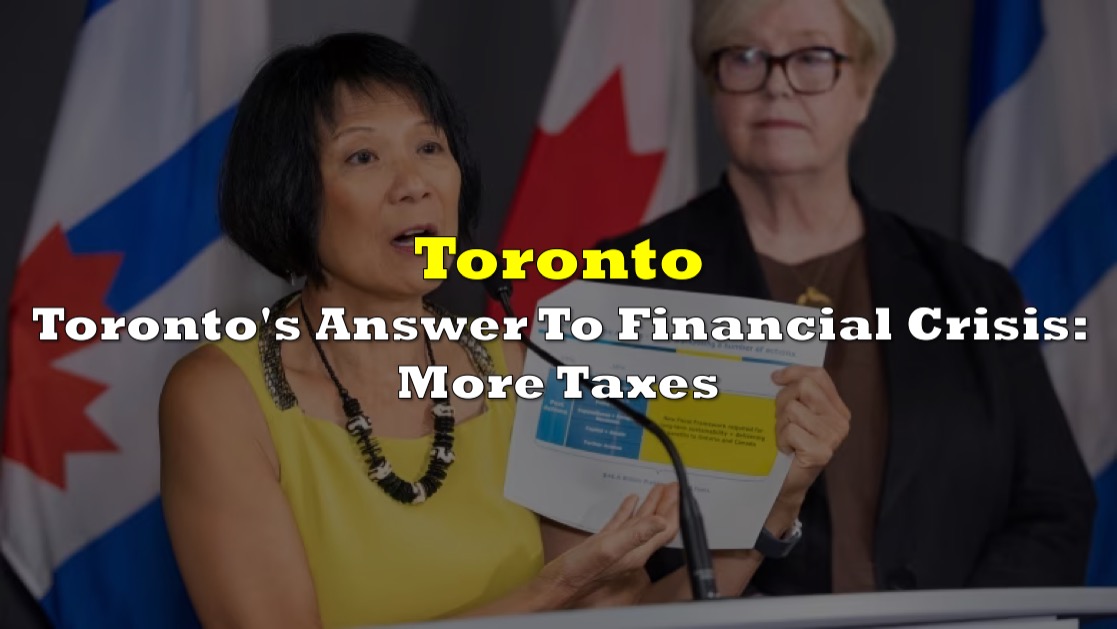In response to an unprecedented financial crisis, Toronto is considering a move to alleviate a projected $46.5 billion budget strain over the next decade. The proposed measure includes a municipal sales tax, which forms a crucial component of a comprehensive plan unveiled in a long-awaited staff report released on Thursday.
The plan’s cornerstone is the introduction of a 1% sales tax, to be applied to the existing HST/GST structure. The report underscores the urgent need for innovative revenue tools to counterbalance the fiscal impact of the COVID-19 pandemic and safeguard the city’s economic stability.
“There will be devastating consequences for the City of Toronto and the greater region and country without serious attention given to address the city’s financial challenges,” the report said.
The report also underscored the city’s contribution of 20% to Canada’s GDP and a substantial 53% to Ontario’s GDP. Failure to address this financial crisis could lead to severe consequences not only for Toronto but for the broader region and the nation.
Mayor Olivia Chow, speaking at a news conference, emphasized the importance of confronting the financial realities the city is facing. She highlighted that despite the adoption of various potential revenue sources outlined in the report, these alone may not bridge the gap caused by projected budget shortfalls.
“To build a city we deserve, after years of debate, we need to face facts. Including the fact that time and time again the city has been asked to step up and fund things that are a responsibility of other levels of government,” Chow stated.
Chow highlighted instances such as housing refugees, constituting a third of the city’s 9,000 shelter occupants, and long-term care to underscore her point.
The staff report highlights that a staggering $1.1 billion of Toronto’s annual property tax revenue is allocated to extending federal and provincial responsibilities. Councillor and Deputy Mayor Jennifer McKelvie echoed this sentiment, pointing out that Toronto’s municipal services receive a disproportionately small portion of Ontario’s and the federal government’s budgets.
In July, Deputy Prime Minister Chrystia Freeland declined Toronto’s appeal for a bailout to address the city’s financial challenges, asserting that the Ontario government is well-positioned to offer assistance.
In a letter addressed to Chow, Freeland highlighted the substantial support Ottawa has already provided to Toronto, totaling $6.14 billion over the past eight years. This support, which included significant investments during the COVID-19 pandemic, played a crucial role in bolstering the province’s finances.
“However, the ability of the federal government to spend is not infinite – and the emergency support we provided during the pandemic led directly to the excellent fiscal position that the Province of Ontario currently enjoys,” Freeland said.
She cited the provincial government’s projected surplus of $4.4 billion by 2025-26 in its recent budget. Additionally, the federal government went above and beyond regular transfers, providing over $10.2 billion in extra support during the pandemic.
Municipal sales tax
The report recommends the implementation of a municipal sales tax, projected to generate between $800 million and $1 billion annually. However, such a tax would require amendments to the City of Toronto Act. This initiative is vital as Toronto faces anticipated budget shortfalls ranging from $1.5 billion to $1.7 billion for the current year and the next.
Coun. Shelley Carroll, the city’s budget chief, emphasized that several major American cities have successfully implemented city sales taxes, suggesting this could be a viable path forward for Toronto.
“We’d be the first people in Canada doing that, but I dare say that is the future of Canada or any G7 country with major cities of three million or more,” Caroll said.
Implementing a sales tax could enable Toronto to fulfill its objectives concerning the expansion of transit, the shelter strategy, and housing initiatives, Carroll argued. “If you don’t spend any money you don’t pay that tax. If you spend a lot of money you pay more of that tax. That’s why it’s the most fair way,” she added.
City Manager Paul Johnson underlined the necessity of a transformative approach, “something that is a game changer.” The report outlines various measures that could be rapidly pursued within the city’s authority, including progressive land-transfer tax rates on high-value homes and an increase in the vacant homes tax.
“Inaction is no longer an option. And we must move forward on some of these. It’s why our recommendations in this report are action-oriented,” Johnson said. “The failure to do so, means that we will have to take a look at other metrics, which will be devastatingly impactful to the people who live, work, play and learn in this community.”
“Significant tax increases”
City staff emphasized the critical need for increased funding from higher levels of government to avert the potential for “significant tax increases,” significant reductions in essential services, or even the abandonment of capital projects that align with shared objectives. While some municipal measures could contribute additional revenue to the city’s treasury as early as next year, they acknowledge that these steps will likely fall short in addressing the city’s fiscal risks both in 2024 and over the ensuing decade.
Johnson emphasized the necessity for fresh approaches in collaboration with provincial and federal authorities, stating, “We need new deals, we need new ways of working with the provincial and federal government. There simply is not a pathway locally, that we can get to a stronger point of sustainability.”
Furthermore, city staff are urging the council to communicate to the province that, in the absence of a revised funding model, the city may be unable to proceed with the planned introduction of 978 new long-term care beds in the forthcoming years. Additionally, a warning has been issued that the city may have to consider halting collaborative efforts with the provincial government on upcoming transit projects.
In response to budgetary challenges posed by the COVID-19 pandemic and a challenging long-term economic outlook, former Mayor John Tory initiated a request in February for the exploration of novel revenue-generating tools. This action is necessitated by projected budget shortfalls of $1.5 billion for the current year and the subsequent one.
City officials of a high rank have consistently cautioned over several years that the city’s financial stability remains susceptible to a crisis. The pandemic exacerbated this vulnerability, with soaring costs for public health being coupled with a sharp decline in revenue, notably from sources such as TTC fares.
Following her victory in a June by-election, Chow expedited the report’s preparation. The executive committee, chaired by her, is scheduled to deliberate on the report’s recommendations during a special meeting on August 24, followed by a council session on September 6.
Information for this story was found via CBC and the sources mentioned. The author has no securities or affiliations related to the organizations discussed. Not a recommendation to buy or sell. Always do additional research and consult a professional before purchasing a security. The author holds no licenses.









